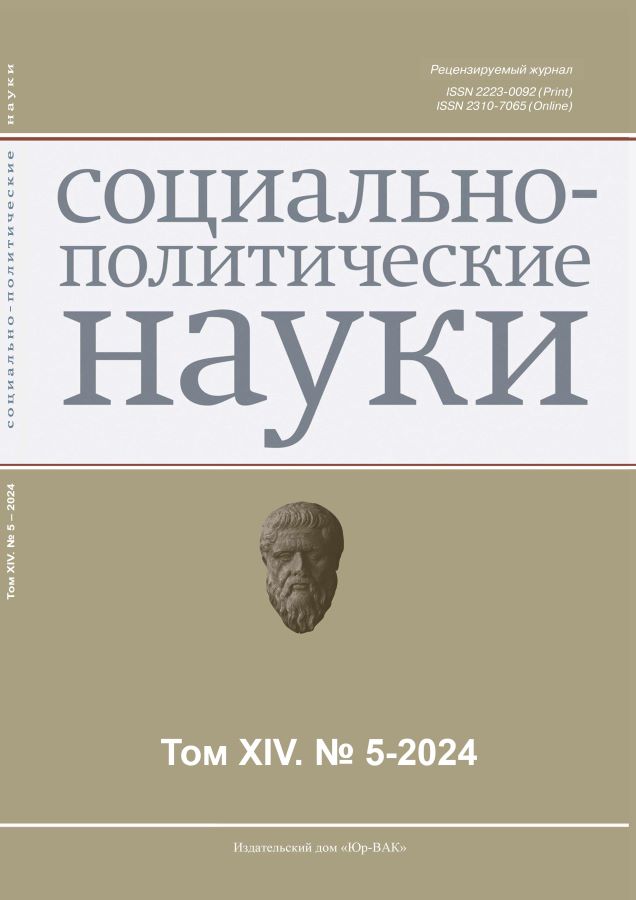A model of the social assistance system for convicts serving sentences in russian penitentiary institutions
- Authors: Borichevskaya E.I.1
-
Affiliations:
- Financial University under the Government of the Russian Federation
- Issue: Vol 14, No 5 (2024)
- Pages: 179-185
- Section: Sociology of management
- URL: https://journals.eco-vector.com/2223-0092/article/view/655540
- DOI: https://doi.org/10.33693/2223-0092-2024-14-5-179-185
- EDN: https://elibrary.ru/SNZBNM
- ID: 655540
Cite item
Abstract
The purpose of the study. The article considers indicators reflecting the direct and indirect results of social work with convicts. At the same time, the work notes that despite the regulatory framework, which specifies measures to work with this category of individuals, there are currently no specific indicators of the effectiveness of social work with convicts in the legislation. The lack of clear and measurable indicators of the effectiveness of such work raises a number of problems. According to various sociological studies and departmental statistics, today the proportion of repeat crimes is 68%. This percentage indicates that society is still facing a serious problem of recidivism, thereby emphasizing the ineffectiveness of the existing social work with convicts.
Conclusions. Based on the conducted research, the indicators determining the effectiveness of social work with convicts have been identified. The author concludes that the specifics of the Russian penitentiary system require transformation and proposes an author’s methodology for evaluating the effectiveness of social work with convicts, which takes into account both the direct results of the measures taken and the indirect effects of re-socialization. It is important to note that the assessment of such work should be comprehensive and take into account various indicators, since it is important to obtain reliable information about the effectiveness of the measures taken and make the necessary adjustments to the work of social services.
Full Text
About the authors
Elizaveta I. Borichevskaya
Financial University under the Government of the Russian Federation
Author for correspondence.
Email: eiborichevskaya@fa.ru
ORCID iD: 0000-0001-7116-4035
junior researcher, Institute of Humanitarian Technologies and Social Engineering, assistant, Department of Sociology, Faculty of Social Sciences and Mass Communications
Russian Federation, MoscowReferences
- Brovkina A.A., Korneev S.A. Resocialization of convicts as the purpose of criminal punishment. Bulletin of the Ural Law Institute of the Ministry of Internal Affairs of Russia. 2020. No. 1. Pp. 97–102. (In Rus.)
- Geranin V.V., Maltseva S.N. Problems of functioning of correctional centers and colony settlements in the system of criminal penalties. Man: Crime and Punishment. 2021. No. 1. Pp. 64–68. (In Rus.)
- Gryaznov S.A. The problem of resocialization of convicts. Fundamentals of Economics, Management and Law. 2020. No. 3. Pp. 47–49. (In Rus.)
- Demidochkina M.Yu., Anfinogenov V.A. Communication as an important condition for correctional influence on convicts. Humanities, Socioeconomic and Social Sciences. 2019. No. 2. Pp. 32–53. (In Rus.)
- Yezhova O.N. The influence of official activity on the personality of employees of correctional colonies with different regimes. Bulletin of the Samara Law Institute. 2018. No .3 (29). Pp. 22–32. (In Rus.)
- Yeremeeva A.A. Characteristics of social networks of convicts. Bulletin of PNRPU. Socioeconomic Sciences. 2020. No. 1. Pp. 45–53. (In Rus.)
- Kornilova T.V., Pozdnyakov V.M., Balamut A.N. A study of the resilience of convicts serving life imprisonment in a correctional colony of a special regime. Penitentiary Science. 2021. No. 1. Pp. 43–56. (In Rus.)
- Kurkina I.N., Sokolova Yu.A. Features of the re-socialization of convicted women serving sentences in the form of imprisonment. Bulletin of the Penal Enforcement System. 2020. No. 2. Pp. 9–15. (In Rus.)
- Lakomova A.A. Technologies of social work with men serving sentences in correctional colonies of strict regime. Nauka. Thought: An Electronic Periodical. 2016. No. 12. Pp. 48–54. (In Rus.)
- Lukovkin K.E. Urban-type colony as a new type of correctional institution. Penal Enforcement Law. 2019. No. 2. Pp. 78–112. (In Rus.)
- Samoilova A.A. On the issue of legal regulation of the conditions and rules of serving sentences in correctional colonies for convicted women. Journal of Applied Research. 2021. No. 2. Pp. 15–34. (In Rus.)
- Teplyashin P.V., Sergienko A.S. The role of the phenomenon of learned helplessness in the resocialization of convicts isolated from society. Scientific Component. 2020. No. 1. Pp. 68–73. (In Rus.)
Supplementary files









